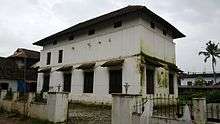List of synagogues in Kerala
There are at least 8 known synagogues in Kerala in recorded history, even though most of them are not operating anymore. One of these belonged to the White Jews of Cochin, while the other 7 belonged to the Malabari (Brown or Black) Jews. [1] Each of these are quite unique in their construction and architecture; nevertheless, they retain very similar aesthetics, blending in both the Jewish and Keralite traditions rarified over centuries.[2]
Only the Paradesi Synagogue in Mattancherry still functions as a synagogue and is a popular tourist destination. The Parur synagogue, Chendamangalam Synagogue, Mala Synagogue and the Kadavumbhagam Ernakulam Synagogue in Ernakulam downtown are open to public visit, even if they do not serve their originally intended religious purposes anymore. They remain as souvenirs representative of Kerala's rich cosmopolitan heritage, religious tolerance and cultural magnificence.
Many old synagogues are completely lost, a notable example being the Kochangadi Synagogue built in 1344 (the foundation stone of which is still retained in the Paradesi Synagogue) mostly likely after the Jews had to abandon Muziris due to the great flood of Periyar river in 1341 .[3][4]
List of Synagogues in Kerala
| Name | Location | Photo | Current state |
|---|---|---|---|
| Paradesi Synagogue | Mattancherry, Kochi |  |
Operational |
| Mala Synagogue | Mala, Thrissur |  |
Non-operational, open to visits |
| Chendamangalam Synagogue | Chendamangalam, North Paravoor |  |
Non-operational; Open to public visits as Kerala Jews Life Style Museum. |
| Kadavumbhagam Ernakulam Synagogue | Market Road, Ernakulam; At the center of the crowded market area |
.jpg) |
Non-operational as synagogue (was functional until 1972, when its membership could no longer support it [8]);
currently hosts a business "Cochin Blossoms" |
| Thekkumbhagam Ernakulam Synagogue [11] | Jew Street, Ernakulam; On the north side of Jew Street, between |
Non-operational as synagogue;
It has served as a gathering hall for community events in recent years. | |
| Kadavumbhagam Mattancherry Synagogue | Mattanchery | Non-operational | |
| Thekkumbhagam Mattancherry Synagogue | Mattancherry | Non-operational and non existing anymore; Bought by a Paradesi Jew after the congregation left to Israel in 1955, | |
| Parur Synagogue | North Paravoor (Parur) [13] | Non-operational; Open to public visits as Kerala Jews Historical Museum |
List of Lost Synagogues in Kerala
Many old synagogues are completely lost and their historic sites are not yet clearly identified or geo-located. Some of the known ones [4] from the 2nd millennium (identified either from recorded history or oral tradition) include:
- Kochangadi Synagogue
- Muttam Synagogue
- Tir-Tur Synagogue
- Saudi (or Southi) Synagogue
- Palur Synagogue
- Fort Kochi Synagogue
See also
References
- ↑ Mandelbaum, David G. (1939). "The Jewish Way of Life in Cochin". Jewish Social Studies. 1 (4): 423–460. JSTOR 4464305. (Registration required (help)).
- ↑ India’s Synagogue Variety: Architecture, History, and Context, Jay A. Waronker, Café Dissensus, 31 December 2014
- ↑ Indian Jews: This little known minority community has a rich heritage, Sifra Lentin, First Post, 26 June 2016
- 1 2 Lost Kerala Synagogues, Jay A. Waronker, Friends of Kerala Synagogues, 2011
- ↑ Kadavumbagam Synagogue, Ernakulam, Jay A. Waronker, Friends of Kerala Synagogues, 2011
- ↑ Only 26 Jews left in this Indian city — and they still can’t get along, Danna Harman, Haaretz, Mar 31 2016
- ↑ The Last Jew on Jews Street, Karen Saul, Haaretz, 21 April 2003
- ↑ Synagogues360: Kadavumbagam Synagogue, SYNAGOGUES360, A Visual and Historical Record of Synagogues from Around the World - 360° panoramas of Jewish Culture, 2013
- ↑ History preserved – Cochin Blossoms, Potliwalas, 2013
- ↑ Kerala - Kadavumbagam Ernakulam Synagogue, Indian Jewish Heritage Center, 2014
- ↑ Tekkumbagam Synagogue, Ernakulam, Jay A. Waronker, Friends of Kerala Synagogues, 2011
- ↑ Kerala - Tekkumbagam Mattancherry Synagogue, Indian Jewish Heritage Center, 2014
- ↑ A revival of Jewish heritage on the Indian tourism trail, Shalva Weil, Jerusalem Post, 16 July 2010